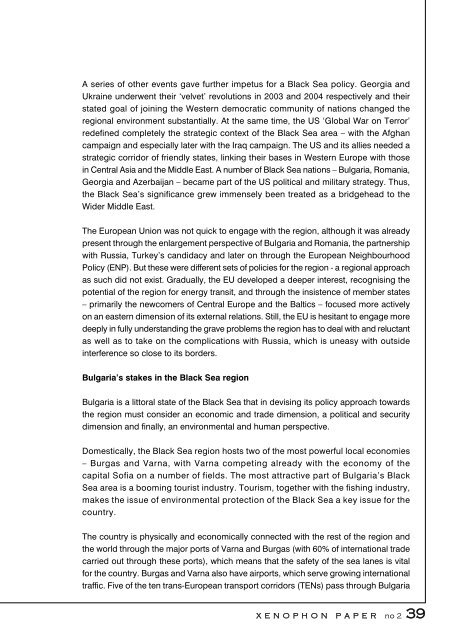Xenophon Paper 2 pdf - ICBSS
Xenophon Paper 2 pdf - ICBSS
Xenophon Paper 2 pdf - ICBSS
Create successful ePaper yourself
Turn your PDF publications into a flip-book with our unique Google optimized e-Paper software.
A series of other events gave further impetus for a Black Sea policy. Georgia and<br />
Ukraine underwent their ‘velvet’ revolutions in 2003 and 2004 respectively and their<br />
stated goal of joining the Western democratic community of nations changed the<br />
regional environment substantially. At the same time, the US ‘Global War on Terror’<br />
redefined completely the strategic context of the Black Sea area – with the Afghan<br />
campaign and especially later with the Iraq campaign. The US and its allies needed a<br />
strategic corridor of friendly states, linking their bases in Western Europe with those<br />
in Central Asia and the Middle East. A number of Black Sea nations – Bulgaria, Romania,<br />
Georgia and Azerbaijan – became part of the US political and military strategy. Thus,<br />
the Black Sea’s significance grew immensely been treated as a bridgehead to the<br />
Wider Middle East.<br />
The European Union was not quick to engage with the region, although it was already<br />
present through the enlargement perspective of Bulgaria and Romania, the partnership<br />
with Russia, Turkey’s candidacy and later on through the European Neighbourhood<br />
Policy (ENP). But these were different sets of policies for the region - a regional approach<br />
as such did not exist. Gradually, the EU developed a deeper interest, recognising the<br />
potential of the region for energy transit, and through the insistence of member states<br />
– primarily the newcomers of Central Europe and the Baltics – focused more actively<br />
on an eastern dimension of its external relations. Still, the EU is hesitant to engage more<br />
deeply in fully understanding the grave problems the region has to deal with and reluctant<br />
as well as to take on the complications with Russia, which is uneasy with outside<br />
interference so close to its borders.<br />
Bulgaria’s stakes in the Black Sea region<br />
Bulgaria is a littoral state of the Black Sea that in devising its policy approach towards<br />
the region must consider an economic and trade dimension, a political and security<br />
dimension and finally, an environmental and human perspective.<br />
Domestically, the Black Sea region hosts two of the most powerful local economies<br />
– Burgas and Varna, with Varna competing already with the economy of the<br />
capital Sofia on a number of fields. The most attractive part of Bulgaria’s Black<br />
Sea area is a booming tourist industry. Tourism, together with the fishing industry,<br />
makes the issue of environmental protection of the Black Sea a key issue for the<br />
country.<br />
The country is physically and economically connected with the rest of the region and<br />
the world through the major ports of Varna and Burgas (with 60% of international trade<br />
carried out through these ports), which means that the safety of the sea lanes is vital<br />
for the country. Burgas and Varna also have airports, which serve growing international<br />
traffic. Five of the ten trans-European transport corridors (TENs) pass through Bulgaria<br />
X E N O P H O N P A P E R no 2 39









